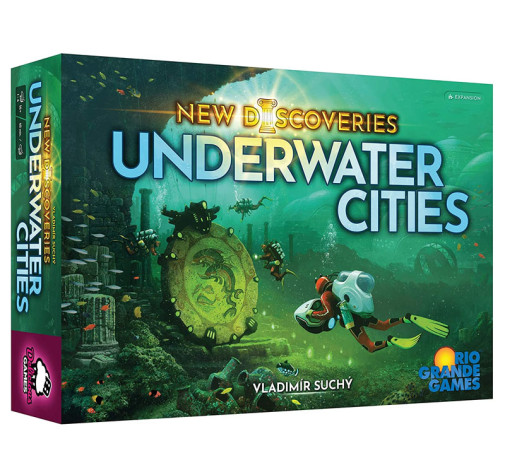We use cookies to make your experience better. To comply with the new e-Privacy directive, we need to ask for your consent to set the cookies. Learn more.
Underwater Cities Game - New Discoveries Expansion
What does this expansion add to Underwater Cities that makes it worth considering? It does not significantly change the already amazing gameplay of Underwater Cities but it brings additional resources and new variant choices for its play that can enhance your experience with the game. To start, there are new cards for all of the Era Decks as well as the Special cards. Because sometimes resources can run low at a higher player count, there are additional tokens for farms, laboratories and desalination plants. One of the nicest additions are the eight new double- sided player boards, mostly because they provide a two-dimensional environment where cities, tunnels and buildings are placed in indented niches so that they do not move around during gameplay. These also provide four different types of boards – some of which the game uses with specific game variants. With regard to new gameplay opportunities provided in this expansion, the new mini-versions that you can now use with the standard game are:
- Metropolis Race – First, distribute brown Metropolis tiles to each player as usual. Instead of assigning blue metropolis tiles to each player, randomly choose both blue and new green metropolis tiles and place them near the main board. As each player completes a tunnel connection to the first open metropolis space on their board, they choose an available blue tile. When a player connects their final empty slot, they choose a green tile. This “race" gives players the opportunity to compete for their chosen tiles.
- Metropolis Choice - This variant uses the player boards numbered 13-16 as they specify the numbers and types of metropolis tiles that a player will start with. For instance, one player may start with two tiles each of blue, green and brown while another may start with four blue and two green. Each player will choose three of the tiles, which matches up to preprinted colors on their board.
- Museum - Included with this version of play is a Museum Board with two sides. Players specifically use their player boards 9-12 and have the chance to access discovery tiles for special rewards. There are two sides to the museum board, which vary with regard to setup of a player's metropolis tiles.
This expansion offers a solo experience or plays with 2-4 players. It commonly creates a 40-minute game time per player. The base game Underwater Cities is required to play.
New Discoveries, is the first expansion to the wildly popular game, Underwater Cities.
It offers many new challenges to players who own the original game. It is a Must-Have if you own the original game!
Please also see our Logic - Games section for more excellent strategy games.
| Product Format: | Other |
|---|---|
| Brand: | Rio Grande Games |
| Grades: | 9-AD |
| EAN/UPC: | 655132005876 |
| Length in Inches: | 9.125 |
| Width in Inches: | 12.625 |
| Height in Inches: | 2.875 |
| Weight in Pounds: | 3.25 |

